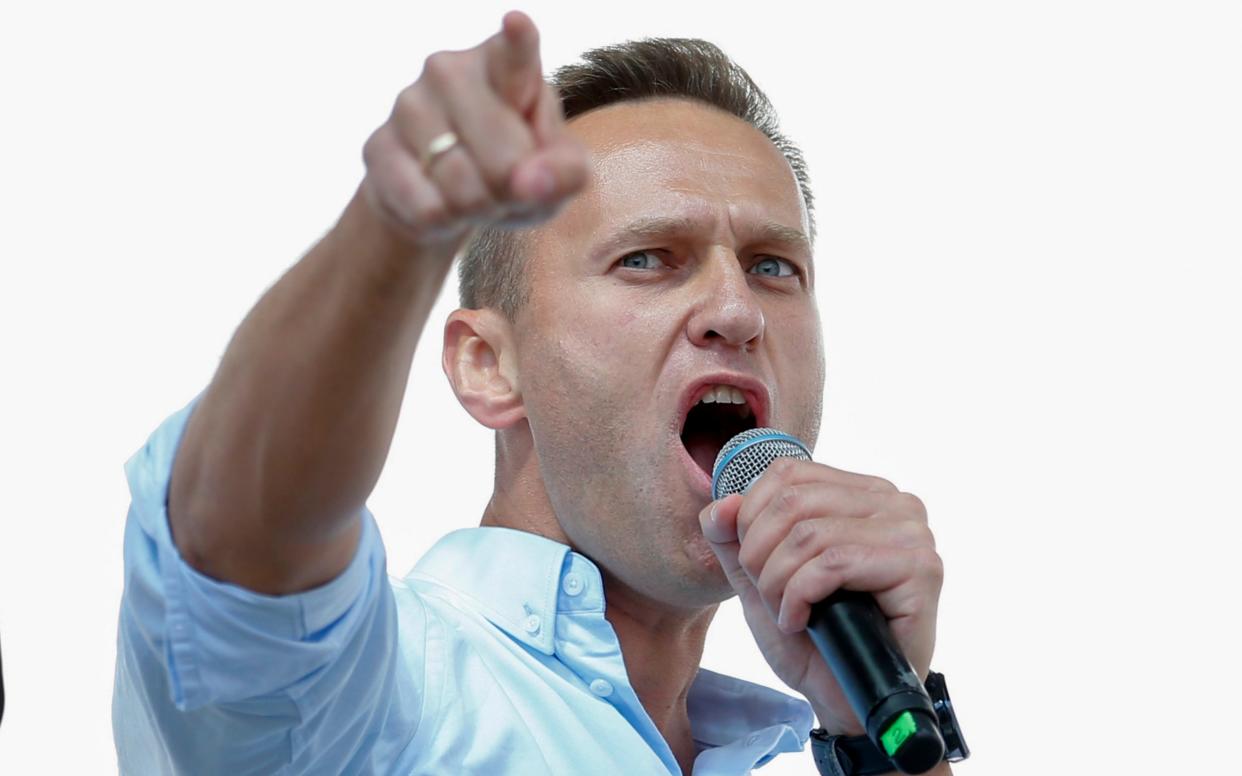Russian intelligence agents reported to be behind Navalny poisoning

- Oops!Something went wrong.Please try again later.
Several members of a Russian elite intelligence unit trailed opposition leader Alexei Navalny for days before he was poisoned with a deadly nerve agent in August, a joint investigation by forensic intelligence group Bellingcat and several media outlets revealed on Monday.
Mr Navalny, who spent weeks in a coma before recovering, said he backed the findings and blamed President Vladimir Putin for the attempt on his life.
“With all the facts that we have now, I can say that FSB agents were plotting a terrorist attack on Putin’s orders,” he said in a YouTube video, laying out the details of the investigation.
He described the botched poisoning as Mr Putin’s “personal plan and his personal failure.”
Phone records, flight manifests and other documents obtained by Bellingcat, Russia’s The Insider, CNN and Der Spiegel identified a team of eight agents of the FSB, the main successor to the Soviet Union’s intelligence agency, who were in close contact at various stages of the alleged operation to poison Mr Navalny for several days before he fell ill.
Bellingcat described the FSB unit as one that specializes in working with poisonous substances.
Three unit members, Vladimir Panyaev, Alexei Alexandrov and Ivan Osipov, two of them reportedly medical doctors, traveled alongside Mr Navalny and followed him all the way to the Siberian city of Tomsk where he was poisoned in August.
The Kremlin has denied any involvement.
The poisoning appears to have happened after years of surveillance which began in 2017 shortly after Mr Navalny announced his campaign for Russian presidency.
Phone records and travel data showed the same members of the FSB unit followed Navalny across Russia on more than 30 different trips.
The 44-year-old politician led massive anti-government protests in 2011-2012 and mounted an impressive presidential campaign across Russia before he was barred from running in 2018.
He fell suddenly ill on a plane from Tomsk to Moscow on Aug 20 and was flown to Germany several days later for treatment. He spent three weeks in a coma before recovering and is still believed to be convalescing.
Several European laboratories independently confirmed that Mr Navalny’s blood had traces of the Soviet-era nerve agent Novichok, which was also used in the 2018 Salisbury poisoning of former Soviet spy Sergei Skripal and his daughter.
The European Union earlier this year imposed sanctions on six top Russian officials and a chemical research centre over the Navalny incident. Russian officials have so far refused to investigate.
The Russian opposition leader on Monday revealed that he had a drink at the bar of his hotel in Tomsk the night before - the bartender’s recommendation.
“The cocktail tasted like the most disgusting thing I’ve had in my life,” Mr Navalny said.
He went to sleep and early in the morning he boarded the plane where he fell ill.
Mr Navalny also suspects that FSB agents tried to poison him twice before that.
Less than two months earlier, his wife Yulia fell suddenly ill while the couple was on holiday at a spa hotel in Russia’s westernmost exclave of Kaliningrad.
She made a complete recovery the following day, but Mr Navalny suggested that she accidentally touched an object or food “that was meant for me.”
Flight data show that at least three members of the FSB unit travelled to Kaliningrad at the same time.
Neither the Kremlin nor the FSB were immediately available for comment.
Over the past years, Bellingcat has identified that agents of Russia’s military intelligence agency GRU were sent to the UK to poison former Russian spy Skripal. Russia has repeatedly denied involvement in the case.

